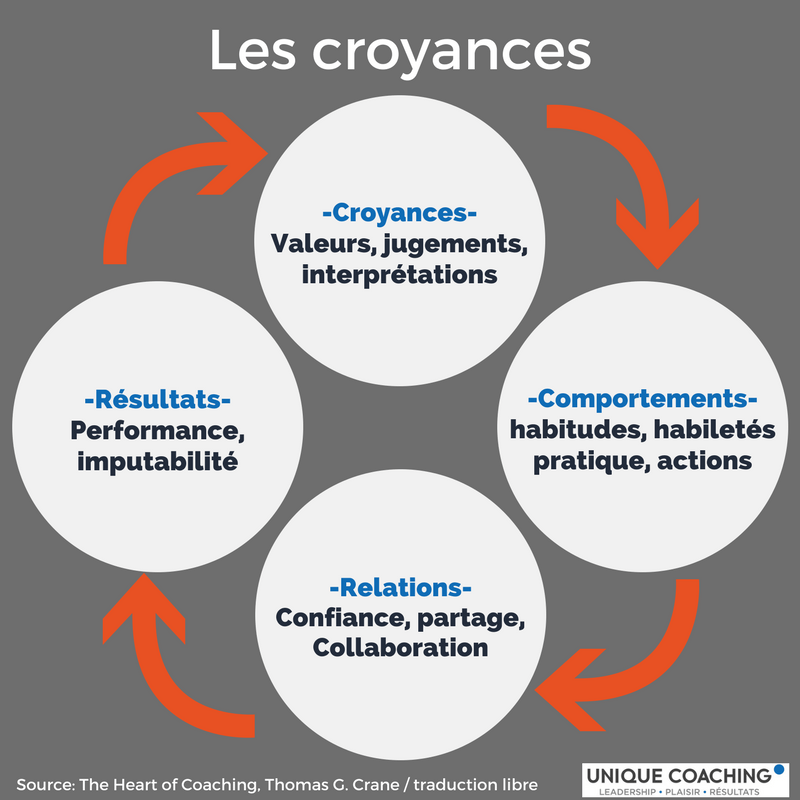The “young people” don’t want to work.
After the age of 50, there is no chance of finding a job.
I have to answer the phone as soon as it rings.
You have to work hard to succeed.
What are your beliefs? We ALL have beliefs. These beliefs, or convictions, have been instilled in us by our education and models or built by our experiences.
The idea here is not to reject all your beliefs, but to see if they serve you. Let’s first look at what beliefs are, how they influence us and then tools to transform the beliefs that limit us (or limiting beliefs).
Beliefs and their influence
Here is an image taken by me from the book “The Heart Of Coaching” by Thomas G. Crane and its explanation via an example.

Our beliefs determine our behaviors
Martin believes that you have to work “hard” and long hours to be noticed and get a promotion in your organization.
He judges those who only work the minimum time required and is shocked when he sees that a colleague does not complete the minimum hours.
He does a lot of work and is present for long hours.
Our behaviours influence our relationships
Martin surrounds himself with colleagues who think like him. He has more trust in this type of person and feels understood.
Our relationships affect our bottom line
Martin will likely get a promotion in his organization. This will strengthen his beliefs, because…
Our results reinforce our beliefs
Most managers and leaders hire people who are similar to them, in terms of values, beliefs or personality style, This does not mean that teams are homogeneous, because many skills and talents can be different. What this means is that through values, judgments and convictions, we create a culture.
The case where the belief does not produce the desired result
This is where it gets complicated. The person who is aware of this and wants to change can find tools or support. Otherwise, one way to solve this problem is to change a factor in the environment.
Let’s go back to Martin. Let’s say he changes jobs and finds himself in a company where the number of hours is not valued. For him, it will be a shock, because if he keeps his behavior, he will be the one who will be judged. He will therefore have the choice to create a new belief or to find an environment that suits him better.
How do I know if it’s a belief that’s limiting me?
Ask yourself the following three questions.
#1 Is this true?
Look for proof of what you say. Is this indisputable?
#2 Is it beneficial?
Does continuing to believe in this bring you joy, happiness, confidence, peace?
#3 Is it helpful?
Does holding on to this belief help you achieve your life goals, your business goals? If so, keep it. If not, change this belief for a more useful one.
How to transform your beliefs?
1- Create new beliefs
What would be true, useful, and beneficial for you?
2- Find a role model
Who has this new belief? Discuss this with this person. Even if you don’t know her. Social networks are for that, no. connect?
3- Like any change, put it into action…
… as quickly as possible and one step at a time! For personal changes to work, you need to have a very specific result in mind. Take the wheel back and cycle backwards.
Yes! You got it right. Redo the wheel in the opposite direction.
- Set the results you want.
- Do what it takes to develop relationships that will contribute to this.
- Develop useful behaviors .
- Enjoy the creation of this new belief.
Changing one’s beliefs requires courage and agility to be. Being agile is about being able to adapt as a person. Unique coaching offers self-training on the topic: Developing your agility to be: managing stress, emotions and energy. Subscribers to our newsletter have a discount on all our self-training courses and they combine business with pleasure by receiving a new blog article 1 or 2 times a month! Here is the link to subscribe.
In conclusion on beliefs
We all have beliefs. If you are dissatisfied with your results AND want to take a step back from your beliefs, give yourself the gift of getting to know yourself better.
Define what you want to create, adjust accordingly, and you’ll get the results you want.




